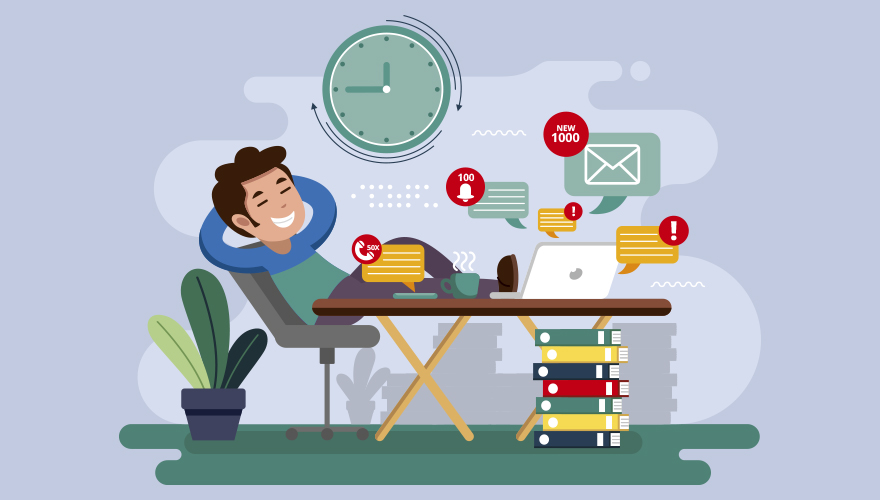There’s a lot of demand on us these days to be efficient and save time. Since time equates money and work output equals performance, we must do more than just amazing work; we must also do efficient work. Productivity, on the other hand, isn’t just a bourgeois ruse to induce workers to make more money.
Look At the 10 Key Principles of Productivity
Being productive can help us achieve a better work-life balance, job happiness, personal fulfilment, and satisfaction in the work we accomplish. Being productive, however, is easier than it sounds. Productivity techniques are methods for getting high quality with less effort by tapping into productive flow experiences.
In order to help you cut through the clutter, we’ve compiled a list of ten of the most effective productivity tactics you should be aware of. Although they may not all work for you, it’s worth doing your own tiny productivity trial to see if they can help you handle and talk about your work even better.

Always keep in mind the rule of diminishing returns.
When it concerns to productivity apps, more isn’t always better. Consider how much integration time is required for each person to adopt and learn each tool. Also consider how much time it can take to use so many instruments for each task.
Multitasking isn’t always a productivity philosophy, but employing technologies and equipment that do the multitasking for you is. Simply by not trying to accomplish too much, you can greatly boost productivity by reducing the number of tools you use and relying on just a few excellent, easy-to-use ones.

Limit the number of tasks you switch between.
Task switching is one of the most time-consuming aspects of modern work culture. The time you lose switching from one unfinished job to another is known as task switching. It’s a type of distracted focus characterised by an inability to focus on a single item for an extended period of time. When you have too many alerts or notifications switched on and feel compelled to address incoming concerns right away, you may unknowingly fall to task switching inefficiencies.

Keep your distractions to a minimum.
While smartphones are one of the most significant technological advancements of our time, they can also feel like the scourge of our life at times. Many of us suffer from phone addiction, which makes it tough to entirely detach from social media, texting, gameplay, or any other applications or networking software we use on a regular basis. Some of this is driven by FOMO, or “fear of missing out,” but many of us would rather scroll through Instagram than tackle a job task.
Your smartphone could be one of the main reasons you’re unproductive, postpone excessively, and can’t seem to focus on anything for lengthy periods of time. As a result, you must first determine the severity of the situation. You can now check your actual data on how much time on screen you’re using and what kinds of activities you’re doing thanks to new upgrades on most devices.
If you’re having trouble breaking the habit, try using a blocking software that allows you to restrict access to specific applications or features on your phone for specific periods of time or between specific hours of the day. So, even if you’re tempted, you won’t be able to be sidetracked by your phone due to physical limitations.

Productivity should be motivated by a specific goal.
A lack of purpose at work, or even in our personal lives, is a major cause of inefficiency. We can become much more motivated when we understand not only what we need to get done, but why we need to get it done. When working towards a goal, it’s natural to consider why you want (or need) to accomplish it. We lose our sense of purpose when we lack direction, don’t comprehend why something is needed, or are unsure about a consequent outcome or follow-up activity.
The majority of us despise busywork. We want to know that what we do makes a difference or is part of a larger picture. Productivity drops when our activity doesn’t seem to have a purpose. These factors are sometimes beyond our control, but if you want to be your most productive self, think about why you need to get something done and use that as a drive.

Make a list of your top priorities.
One of the most common causes of inefficiency (and, in particular, task switching) is a lack of awareness of our priorities. Prioritize to avoid procrastination and to ensure that you can be effective in the areas that matter.
Emphasizing your to-do list based on urgency is a wonderful place to start, but thinking about priorities can also help you remove tasks that you later realise aren’t that essential. It’s also necessary for determining which chores must be done first in order for future actions to take place.

Use teamwork to your advantage rather than against you.
We’ve all sat through meetings that felt pointless (or as if there was no end in sight), and we’ve all worked with co-workers that made us feel as though we’d rather handle everything ourselves. These circumstances are fairly common productivity killers, although collaboration is required in most firms.
There should be clear job allocation and a working process or system in place to ensure task completion and issue management so that efforts don’t exhaust you and your ability to be productive.
You’ll obtain better outcomes if you can create an environment where co-workers or your leadership team help you be more creative rather than working against one another to get stuff accomplished. You can ensure that connectivity and efficiency are engrained in all you do if you pair it with a properly integrated solution for plan and manage.

Have a backup plan in place.
When things don’t go as planned, not having a backup plan is a significant productivity killer. Things rarely go according to plan at work, as they do in life as well. It’s critical that you know what to do if your first option doesn’t work out in order to stay on schedule, complete assignments, or maintain productivity.
We might often waste too much time shaking our heads and pondering what went wrong from the beginning if we don’t have backup plans. Then we take some time to come up with a fresh solution or a new action plan.

Have a system in place for calculating productivity.
You’ll need a mechanism to measure productivity, just like in most other areas of business. It can be difficult to tell if you’re keeping the same, improving, or falling behind if you don’t know how to assess productivity or, at the very least, what the markers of success are.
Because productivity does not seem the same to everyone, performance is based varies greatly by firm, industry, and individual. But the most important thing is to have a yardstick & benchmark to measure against, whether it’s an industry standard or a goal set within your company or for yourself.

Be a tad more pessimistic.
We’ve all met a time optimist, someone who is always late simply because they aren’t practical (or confident) about how long something will take. Part of becoming more productivity is letting go of delivery commitments we may not be able to keep, and being more honest about our availability, productivity capacity, and when we can accomplish assignments/projects.
When you are highly confident about the amount of time it will take to accomplish a task (i.e., you anticipate too low), you can lose efficiency simply by being anxious about completing it. Or you’re more concerned with getting a task done than with the quality of the effort. To boost productivity, be more practical about what you’ll need to complete particular tasks. Then, if you do the task faster, you can move on to something else on your to-do list.

Take more detailed notes.
Not only is it a pointless exercise for you to have to repeat conversations you’ve already had, but it’s also a waste of time for everyone else who needs to remind you of what was done and said. To get back on track after a fruitful meeting, you’ll need to take good notes and make sure you understand what those notes imply and what you need to do to get things done when you look at them later. One productivity tip is to just jot down ideas as they come to you. Nothing is more aggravating than sipping your morning coffee at home and having a brilliant idea, only to have to wait for 30 minutes trying to recall it at noon.
Lowering the amount of distractions while determining your priorities and purpose is frequently the key to being effective. When making purposeful decisions to increase your productivity, consider integrating your tools, prioritising more effective communication, process mapping, and always having a backup plan.

